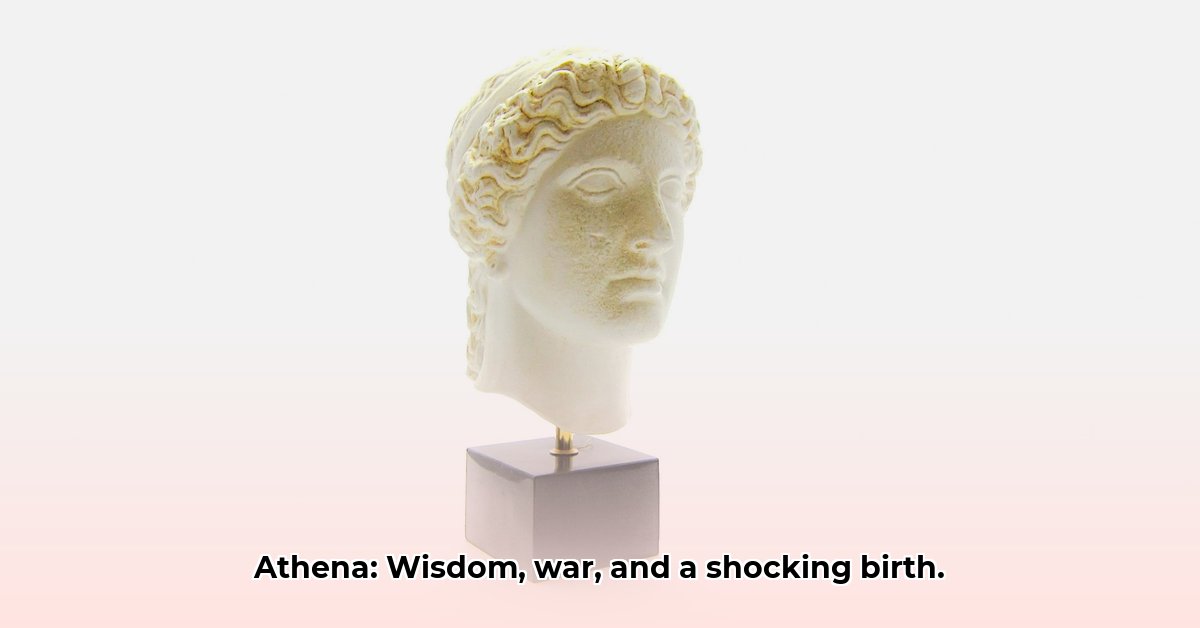
The Miraculous Birth
Athena's birth story stands apart in Greek mythology. Unlike other gods and goddesses born of divine unions, she emerged fully grown and armed from the head of Zeus. Imagine the scene: the mighty king of the gods enduring unimaginable pain as his daughter bursts forth in a blaze of glory. This extraordinary event is crucial to understanding her unique character and influence. Why this unusual birth? The myth connects to Zeus's swallowing of Metis, Athena's mother and goddess of wisdom, who was pregnant with Athena. To prevent a prophecy foretelling Metis's son overthrowing him, Zeus swallowed her – a dramatic act of patriarchal control. This also sets the stage for the unique goddess to come, a goddess of intellect born from a god of raw power. While likely a way to maintain the patriarchal power structure, it also created a unique goddess. Did this unusual birth foreshadow Athena's exceptional nature?
Athena: A Goddess of Many Faces
Despite her frequent depiction in art as a warrior, Athena is far more than just a goddess of war. She embodies strategic warfare, a stark contrast to Ares's untamed brutality. She also represents wisdom, crafts, and protection, with a special connection to Athens. Her wisdom isn't just book learning; it's strategic thinking, skillful craftsmanship, and shrewd political maneuvering. The legendary contest between Athena and Poseidon for patronage of Athens perfectly illustrates this. Athena didn't offer brute force like Poseidon, but the gift of the olive tree – symbolizing peace, prosperity, and wisdom – a gift that ultimately persuaded the Athenians. This speaks volumes about Athenian values. What does Athena's multifaceted nature reveal about the complexities of ancient Greek culture?
Athena in Art and Culture
Ancient Greek artists masterfully captured Athena's complex nature. Sculptures vary depending on their specific context and intended message. She's often depicted in full battle attire, spear in hand, ready for action. Equally common are images and vases showing her with an owl (her sacred animal), a feature symbolizing her wisdom and connection to higher knowledge. The Parthenon, the magnificent temple built in her honour, stands as testament to her immense importance. It's not just a building, but a physical representation of Athenian values – a glorious beacon of wisdom, strength, and strategic thinking, all embodied in the goddess born from Zeus's head. Does such devotion only come to extraordinary figures?
Athena and Athenian Identity
Athena's influence extended far beyond the purely religious sphere. She became intricately woven into the fabric of Athenian society and identity. The Athenians saw themselves reflected in their patron goddess: a people who valued intelligence, strategic planning, and craftsmanship, alongside military might. They championed arts and crafts, a flourishing democracy, and maritime dominance. Do you see the parallels with their fierce protector? The story of Athena's birth isn't merely a mythological narrative, but a foundational myth that shaped the city's self-perception and influenced its cultural trajectory for centuries. This extraordinary birth story provides a powerful metaphor for the birth of a city's identity, a city defined by her guidance. How did Athena's unique attributes become intertwined with Athenian self-image?
Interpreting the Myth Today
Even today, Athena's birth from Zeus's head continues to be reinterpreted. It invites us to consider the complex interplay between power, intellect, and mythology's lasting legacy on culture. Her story transcends time, challenging us to reconsider notions of gender, power, and the nature of wisdom itself. What aspects of Athena's legacy continue to resonate with us today? How do you see her reflected in modern society? Ongoing research continues to unravel the meaning and impact of this myth, with new perspectives and interpretations regularly emerging. How has the interpretation of this myth changed over time?
Key Takeaways:
- Athena's unique birth, fully armed from Zeus's head, established her as a remarkably powerful and independent figure.
- Her dual nature as a goddess of both wisdom and strategic warfare mirrored Athenian societal values and ambitions.
- Artistic depictions of Athena reflected this duality, emphasizing both her military prowess and intellectual abilities.
- Athena's role as a patron goddess and dispenser of justice underscored Athenian ideals of fairness and reasoned conflict resolution.
- Athena's enduring legacy lies in the lasting impact of her multifaceted nature on shaping cultural values and inspiring artistic expression.